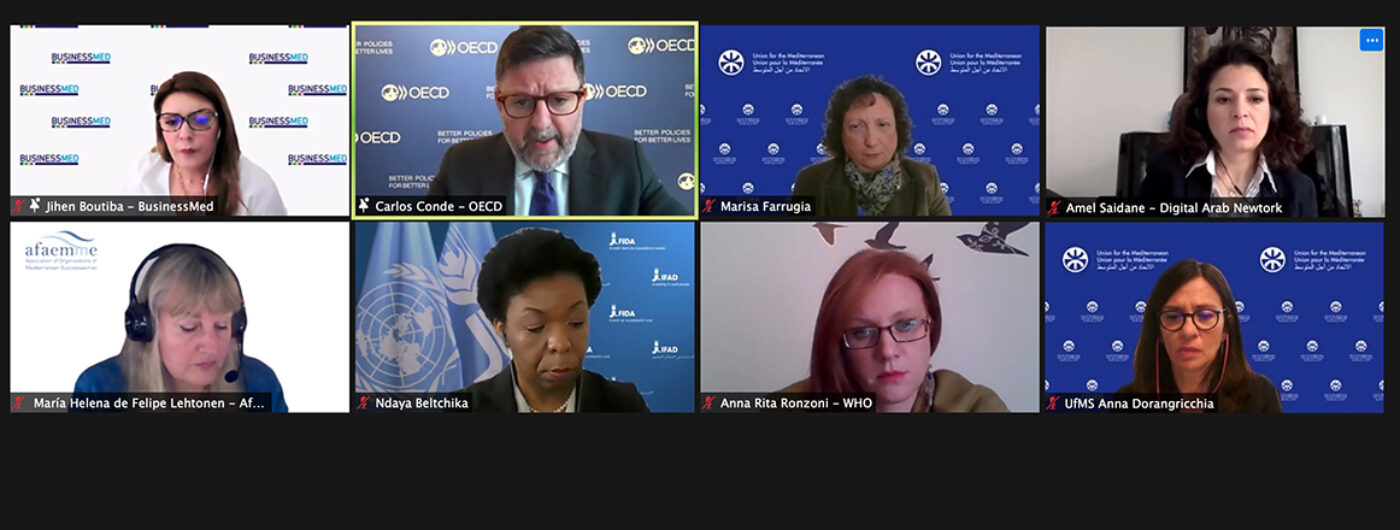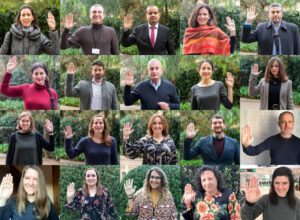
International Women’s Day 2021 – Women: agents of change to build back better
- International Women’s Day is an opportunity to reflect and take stock of the progress made on gender equality, but above all, today should serve as a date to acclaim and recognize women’s societal role.
- Women’s leadership is essential to ensure that women’s needs are prioritized in the pandemic response and recovery, and we do not fall back in the progress made towards achieving gender equality.
- COVID-19 has shown that without women, we cannot fight the pandemic and build back better.
8 March 2020. On this date over 100 years ago, women across the world began to protest and march to claim their right to suffrage, their right to equal pay and better working conditions; and to call for equal human rights. Although life is now easier than it was 100 years ago for some women, progress has been made at a slow pace, and we have not yet attained gender parity.
Grounded on structural inequality, many challenges remain ahead to achieve gender parity, and all of them have now been exacerbated by the Covid-19 pandemic. The gains made in the past decades are now at risk of being rolled back. For that, the theme for this year’s International Women’s Day “Women in leadership: Achieving an equal future in a COVID-19 world” could not be more timely.
As health care workers, nurses or caregivers, women and girls around the world worked relentlessly to fight COVID-19 and to shape a more equal and inclusive future. This crisis has brought to the foreground both the societal relevance of women’s work and the disproportionate burden that they carry. Even if women have been at the frontline of the fight against COVID-19, they remain segregated into lower-paid positions and their voices are left outside the decision-making table. While women made-up most of the frontline response, 85% of COVID-19 national task teams and advisor groups were led by men. Hence, we have male-led response delivered by women.
However, evidence shows that when women are represented in leadership bodies, their outcomes are more likely to be inclusive. Deaths of Covid-19 were 6 times lower in countries where female leaders took early action, and most of the countries that have been more successful in their response are headed by women. More generally, countries with a greater proportion of women as top decision-makers in legislatures have lower levels of income inequality and when women hold more executive leadership positions, their companies are more profitable.
“Our region is weakened by the exclusion of women’s talent, skills and knowledge. In order to achieve the SDGs by 2030, a transformative gender agenda that places women at the same level as men is needed. Gender equality must remain a priority high on national and regional agendas”, Marisa Farrugia, UfM Deputy Secretary General for Civil and Social Affairs.
In order to celebrate the International Women’s day, the UfM hosted online event on 5 March attended by more than 700 participants. In line with this year’s UN theme, the UfM webinar brought together stakeholders from across sectors to analyse the challenges that women and girls face to access leadership positions and share best practices on how to foster women and girls’ leadership across the region. The webinar covered a wide variety of topics, from agriculture and the agri-food sector, women entrepreneurs and the digital economy to the health care sector. Marked by the intervention of DG NEAR on the new EU Gender Action Plan in its external action (Gap III), this webinar was the occasion to present UfM Women Business Forum and the CEED and UNIDO labelled projects.
In addition to pre-existing obstacles to women’s participation and leadership, new barriers have emerged with the pandemic. Across the region, women have faced increased domestic violence, unpaid care duties, unemployment and poverty. They were also assuming high risks as entrepreneurs, as agri-food and health-care works, absorbing the impact of COVID-19 while working toward more inclusive and sustainable societies.
The webinar’s panelists highlighted the need for inclusive legal frameworks and holistic policy making as key to work towards more equitable and inclusive societies, with women as equal participants in all sectors. Speakers agreed on the importance of addressing the root causes of inequality, such as gender stereotypes and cultural norms; that still hinder women’s equal participation in leadership positions and the labour market more generally. Overall, it was agreed that women are a crucial agent of change that can lead our way towards building more resilient economies and societies.
 COVID-19 has pushed the issue of gender parity out of the agenda. But in order to achieve the SDGs in 2030, gender equality must remain a priority. Compromising it in the middle of a crisis could have devastating consequences. A gender transformative agenda that places women at the center and fully leverages their leadership potential is essential to build back better.
COVID-19 has pushed the issue of gender parity out of the agenda. But in order to achieve the SDGs in 2030, gender equality must remain a priority. Compromising it in the middle of a crisis could have devastating consequences. A gender transformative agenda that places women at the center and fully leverages their leadership potential is essential to build back better.
The UfM has always put gender equality and women’s empowerment at the heart of its agenda. This agenda was notably endorsed by the 4th Ministerial Cairo Declaration on Strengthening the Role of Women in Society, 2017, focusing four priority areas, one of which is strengthening women’s access to leadership. To operationalize this agenda, the UfM Member states committed to a unique set of 20 indicators to gather data, monitor progress, evaluate the gender gap, and inform policy and decision making, recognizing the importance of investing in women. Among these indicators, 3 focus on the “women’s access to leadership” priority area.
In the framework of the activities of the UfM Regional Dialogue on Women empowerment, the UfM Secretariat is coordinating the process towards publishing the second regional progress report by the end of 2021 aiming at preparing policy recommendations for the 2022 Ministerial Declaration. An Ad-Hoc Working Group (WG) launched its work on 02 March during a first online meeting. Despite the challenge of data gathering to inform the indicators and of their comparability at regional level, the 60 participants agreed on the need to better coordinate and capitalize on the region’s good practices on women empowerment. The impact of Covid-19 has been acknowledged as a key element to be taken on board for the data gathering, analysis and subsequent policy recommendations. The work ahead is up-hill but the high number of participants proves the strong regional commitment to gathering gender-disaggregated data to inform the region’s resilient pandemic recovery and future action.

